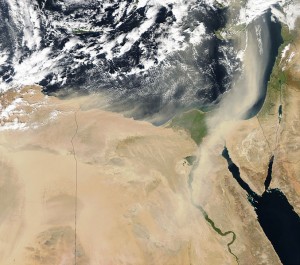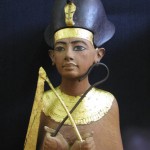 This drop-dead gorgeous picture of the Nile taken from the International Space Station at the end of October prompted some science writers to muse on the enduring importance of the Nile to Egypt. Surrounded by the great darkness of the Eastern and Western deserts, the Nile literally shines like a beacon of light in this image, the source of life in a hostile land.
This drop-dead gorgeous picture of the Nile taken from the International Space Station at the end of October prompted some science writers to muse on the enduring importance of the Nile to Egypt. Surrounded by the great darkness of the Eastern and Western deserts, the Nile literally shines like a beacon of light in this image, the source of life in a hostile land.
Evocative as the photo is, however, it fails to capture the truth, or at least the whole truth. While the Greek historian Herodotus once called Egyptian civilization “the gift of the Nile,” the last two decades or so of research in Egypt’s deserts has shown us that this is far too simple a view. In fact, were it not for the Western Desert–a land of suffocating winds and summer temperatures up to 130 degrees Fahrenheit–we might never have had the glories of the New Kingdom, including Tutankhamun’s famous tomb.
 I learned this recently while chatting with John Darnell, an Egyptologist at Yale. Darnell has spent nearly 20 years trekking ancient roads and caravan tracks that wend across nearly 17,000 square miles of the Western Desert, an area roughly the size of New Jersey. With a small team, Darnell was the first to map and chart this intricate ancient road system. And as Darnell and his team walked the bleak expanses, they began finding amazing things–desert outposts, supply depots, man-made wells, and even a lost city that dates between 1650 and 1550 B.C.E., the end of the Middle Kingdom.
I learned this recently while chatting with John Darnell, an Egyptologist at Yale. Darnell has spent nearly 20 years trekking ancient roads and caravan tracks that wend across nearly 17,000 square miles of the Western Desert, an area roughly the size of New Jersey. With a small team, Darnell was the first to map and chart this intricate ancient road system. And as Darnell and his team walked the bleak expanses, they began finding amazing things–desert outposts, supply depots, man-made wells, and even a lost city that dates between 1650 and 1550 B.C.E., the end of the Middle Kingdom.
It turns out that the late Middle Kingdom was a pretty dark time in Egyptian history. Foreign invaders ruled much of the country. An Asiatic people known the Hyksos ran the Nile delta, while Nubian kings ruled the roost in the south. This left Egypt’s pharaohs only scraps of their former realm, whose capital was Thebes. Yet somehow, these determined rulers turned disaster into triumph, reclaiming their former power and might during the New Kingdom. The question has long been how?
Darnell’s research now suggests one very plausible answer. “The Theban Dynasty may have used its military and economic control of the desert to win the war against the invaders,” Darnell told me. By building cities and military garrisons way out in the hostile desert, the pharaohs could have seized control of lucrative trade arteries, severing vital lines of commerce running north to the Hyksos and south to the Nubians.
And this, says Darnell, may have fattened the Egyptian treasury and permitted the pharaohs “to outflank their enemies in the Western Desert.”
 Such a theory would have sounded absurd to earlier generations of Egyptologists, who mostly spent their careers in the Nile Valley. But the work of the Darnell and other researchers in lands west of the Nile is showing us something new and unexpected: that Egypt was also a civilization of deserts.
Such a theory would have sounded absurd to earlier generations of Egyptologists, who mostly spent their careers in the Nile Valley. But the work of the Darnell and other researchers in lands west of the Nile is showing us something new and unexpected: that Egypt was also a civilization of deserts.
As Carl Sagan once put it so well, “the absence of evidence is not evidence of absence.” And that’s true even with NASA photos.
Upper Photo: Courtesy of NASA
Middle Photo: Dust Storms off Egypt. Courtesy of NASA
Lower Photo: Tutankhamun shabti. Courtesy of Jon Bodsworth
Heather,
Great story! I’d like to read more about the Darnells’ work. So many times in history and prehistory, the so-called “Dark Ages” of a civilization when power is decentralized or fragmented turn out to be times of innovation or incubators of future civilizations.
Hope you’re doing well. I like your blog.
Toni
Toni:
How lovely to hear from you! Hope all goes well!
Here are some more links to the Darnells’ work:
http://www.yale.edu/egyptology/ae_theban.htm
http://www.nytimes.com/2010/09/07/science/07archeo.html?_r=1
http://www.yale.edu/opa/arc-ybc/v28.n16/story4.html
Unfortunately, many of the scholarly articles from the project are behind paywalls.
I absolutely agree with you that so-called Dark Ages are often times of rebirth for civilizations. In fact, I think I need to post on that soon!
And thanks for the kind words on the blog. I’m honored.
Heather
P.S. Toni:
I like your new blog.
For those interested in looking at the new media in a historical context, please check it out at:
http://tonimoore1.wordpress.com/